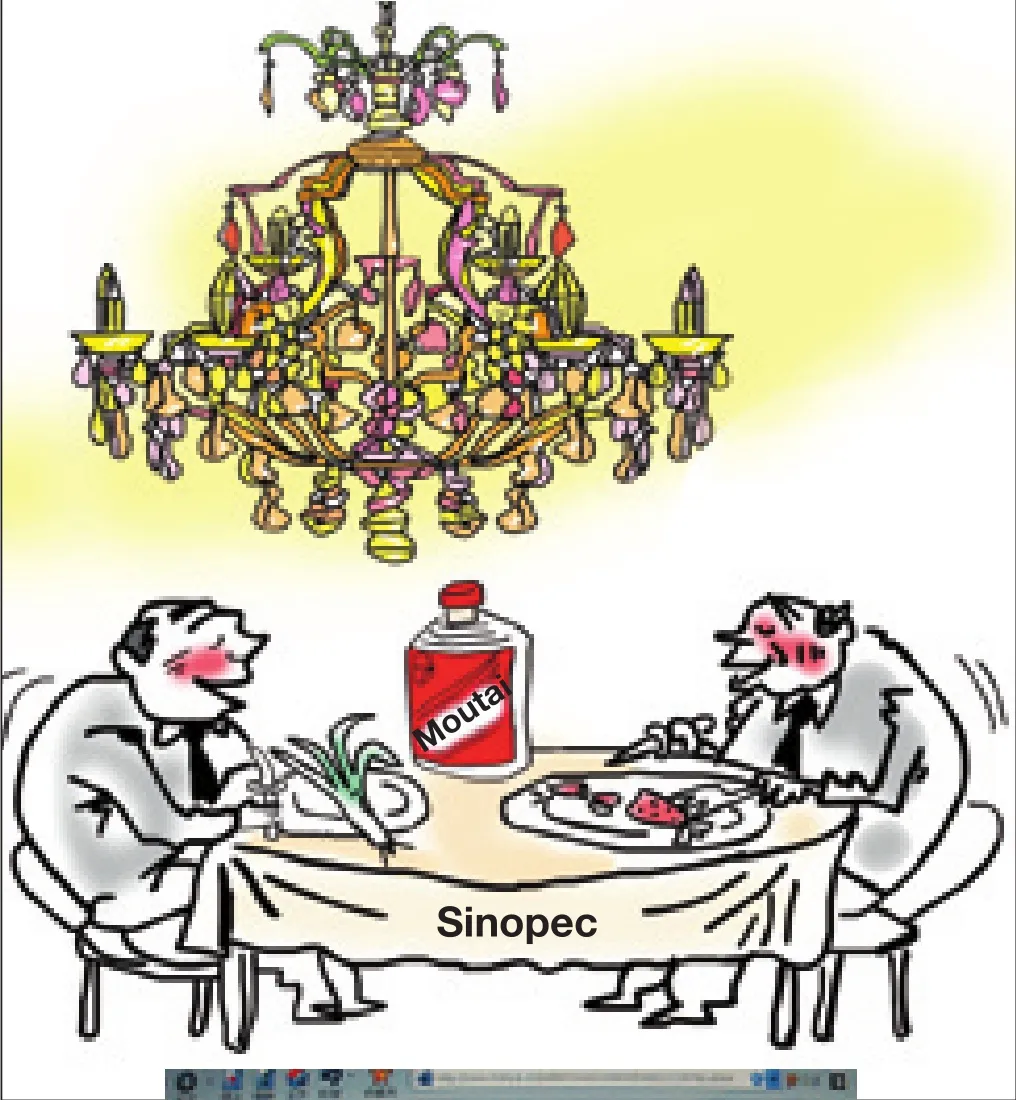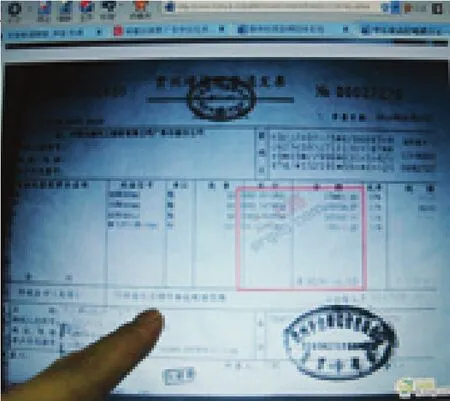Extravagance of Reputation
By YIN PUMIN
Liquor scandal at Sinopec exposes the absence of effective supervision on state-owned enterprises
China Petrochemical Corp. (Sinopec),Asia’s largest refiner, came under fire in mid-April after one of its subsidiaries was exposed to have purchased large quantities of expensive liquor for its head’s private use.
On April 25, Sinopec held a press conference, announcing the demotion of Lu Guangyu, General Manager of Sinopec Guangdong Oil Products Co. who it said was responsible for the extravagant bills worth 2.59 million yuan ($399,000). It also ordered Lu to pay 131,100 yuan($20,170) for the liquor he consumed.
According to Sinopec’s investigation, Lu seriously violated the company’s regulation in decisionmaking, which is “collective discussion and consultation for decisions concerning key matters, appointment of key leaders,arrangement of key projects and usage of large funds.”
Lu’s unauthorized decision to purchase expensive liquor with company cash damaged the image of Sinopec and caused negative impacts on the company’s business, said Fu Chengyu, Chairman of Sinopec, at the press conference.
Abuse of power
The scandal came to light on April 11, when a self-proclaimed insider at Sinopec Guangdong Oil Products Co. posted photocopies of four invoices signed by the company with combined value of 1.68 million yuan ($259,000)on Tianya.cn, a popular online forum, showing the company had spent the money on expensive alcohol.
The postings said Sinopec Guangdong Oil Products Co. had bought upscale liquor worth 2.59 million yuan in three different batches since September 2010.
The purchases included 30 bottles of 50-year Moutai, 30 bottles of 30-year Moutai, 60 bottles of 15-year Moutai and 360 bottles of non-vintage Moutai. Moutai is one of the most famous and expensive spirit brands in China. A bottle of 50-year Moutai sells for about 22,000 yuan ($3,386) and a bottle of non-vintage Moutai sells for more than 1,000 yuan ($154).
The postings showed the company had also bought 696 bottles of imported wines worth 630,720 yuan ($97,083). They included 17 bottles of Chateau Lafite Rothschild produced in 1996, which is priced at more than 10,000 yuan ($1,540) a bottle in China.
The postings said Lu decided to buy the wines and planned to use them at business banquets or give them out as gifts.


SMOKING GUN: Online postings on April 11 show Sinopec Guangdong Oil Products Co. had spent a huge sum of money on expensive liquor, triggering public concern on possible corruption involved
Sinopec Guangdong Oil Products Co.on April 12 confirmed the purchases, but spokesman Xu Tao said the liquor was destined to be resold at stores in Sinopec’s gas stations.
Netizens did not buy the explanation,saying such expensive liquor was unlikely to be sold out at gas station convenience stores.
Reporters with Xinhua News Agency contacted people familiar with business operations of Sinopec’s gas stations in Guangdong, but the interviewees said they had never seen or heard the liquor was available for sale there.
The Beijing Morning Post cited anonymous sources with Sinopec Guangdong Oil Products Co. saying Lu, who had previously worked in Sinopec’s Guizhou branch, had selected Moutai as the main wine to be used for business receptions after being transferred to the Guangdong branch in 2009.
The disclosure of extravagant liquor bills soon made Sinopec a target of public anger, especially at a time when China’s fuel prices are at record high levels.
On April 7, China increased retail gasoline and diesel prices for the second time this year, a move that benefited Sinopec, which has been lobbying for higher fuel prices, or state subsidies, to hedge losses caused by soaring international crude oil prices.
China’s gasoline prices have doubled since March 2005, rising from 3.92 yuan ($0.60) per liter to 7.85 yuan($1.21).
Net profits of Sinopec in 2010 rose 13.7 percent from one year earlier to 71.8 billion yuan ($10.51 billion), according to its statement filed with the Shanghai Stock Exchange in March.
The public blamed the company for extracting too much profit and demanded Sinopec disclose why the liquor was bought.
“Sinopec said it must raise gasoline prices to offset rising costs, while drinking Moutai in an air-conditioned office,” said an online posting.
In response to the tirade of criticism,Sinopec issued a statement on April 14, saying it had sent a team to probe the alleged purchases and promised to publish the results as soon as possible.
The statement said those responsible would be punished if they were found to have violated any laws or Party discipline.
Before April 25, the investigation team twice visited Sinopec Guangdong Oil Products Co. It finally concluded Lu had bought the liquor in company cash for personal consumption.
On this basis, Sinopec decided to demote Lu from his post.
Many netizens have expressed disapproval of the punishment meted out to Lu.
They doubt about Sinopec’s claim that the liquor scandal is an individual matter. Many believe that the case reflects rampant abuse of power and public funds among SOEs.
“All forms of extravagance are rooted in absence of effective supervision,” said Yu Pengyi, a professor at the School of Finance and Economics of Guangdong University of Foreign Studies.
Gu Xiaoming, a professor at the School of Humanities of Fudan University, said Sinopec needs to open up its accounts.
“The top leaders must stand up and apologize to the public immediately when a scandal breaks. This misplaced punishment only shows a lousy corporate culture and slack management,” Gu said.
Absent checks
The extravagant liquor bills are only part of a spate of scandals hitting the state-owned Sinopec in recent years.
In July 2009, online postings claimed Sinopec had splashed out 12 million yuan($1.85 million) on a crystal hanging lamp installed in its Beijing headquarters. The company said later the lamp actually cost about 1.6 million ($246,000).
In February of this year, the company was embarrassed by disclosures that it had ordered its own employees to post online comments supporting fuel price hikes in disguised identity.
Recently, Sinopec was also reported to have bought land in Beijing at an extremely low price and to have run a five-star hotel on it without a license. In 2006, a company of Sinopec spent 50 million yuan ($7.70 million) to buy land in Beijing’s Shunyi District for the construction of Heyuan Royal Garden at about 1,000 yuan ($154) per square meter, one eighth the price of a nearby residential project,according to The Economic Observer business weekly.
The hotel’s owner, Beijing Heyuan Royal Garden Hotel Co., is a company affiliated with Sinopec’s service subsidiary, the report said.
The company did not sign a land transfer deal with the Ministry of Land and Resources until last September, the newspaper said, although the hotel opened for business in 2008.

DAMAGED IMAGE: The building of Sinopec Guangdong Oil Products Co. stands in the center of Guangzhou, south China’s Guangdong Province. The company’s former General Manager Lu Guangyu was demoted on April 25 for buying expensive liquor with company cash for personal consumption
“The ministry allows companies to pay additional fees to obtain rights of a land if they have used the land otherwise than formerly stated,” the newspaper said citing insiders. “It is usually a measure to avoid land auctions and obtain land at low prices.”
The hotel’s website says the building covers 40,273 square meters, but the whole area is 700,000 square meters, including 500,000 square meters of forest.
“The land price is shockingly low if the forest is counted as the hotel’s amenities,”The Economic Observer said.
Mao Shoulong, a professor at Renmin University of China, said no matter what forms of extravagance, squandering huge amounts of public money on lavish dinners,exotic liquor or other expensive commodities, they are all a kind of abuse of power and the money of the public. “Abuse of power is another form of corruption,” he said.
“Since the top leaders of SOEs are appointed by the Central Government to run the companies on behalf of the state and the people, there is no reason for them to consider themselves the boss with the power to spend as much money as they like,” Mao said.
Most SOEs, especially the ones listed on the stock market, are supposed to have a board of directors. The money they earn belongs not just to the state and the people in the broader sense, but also to whoever buys their shares.
“In this sense, the squandering of company money on liquor by the top managers of Sinopec’s Guangdong branch is not just a violation of the rules, but an infringement upon shareholders’ interests as well,” Mao said.
Premier Wen Jiabao has repeatedly lashed out at wasteful spending as a source of corruption and widespread public discontent since he took office in 2003.
But, without proper checks and balances and greater transparency, talks about reining in extravagant spending by officials and SOE executives seldom turn into action.
“At the time that governments at all levels are under heavy pressure to make public their accounts, it is more than necessary for SOEs to be open about their non-production expenses,” Mao said. “The lavish liquor expenses in Sinopec Guangdong branch this time should be a reminder that a mechanism is needed to keep SOEs’ top executives seriously in check.” ■

